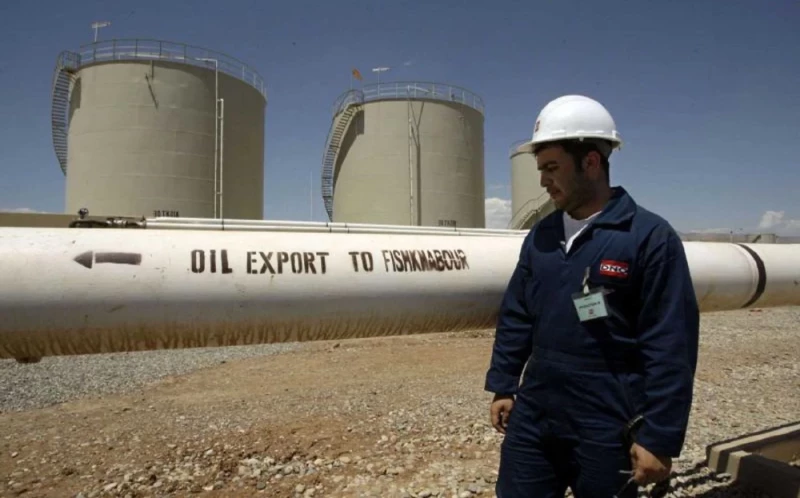DUBAI, UAE - Amid rising tensions and developments in the Middle East, the energy file has emerged as a central issue, with increasing concerns of a further expansion of the conflict, particularly over natural resources like oil and gas reserves. The resources have become a key source of tension between several regional nations and Israel.
Abu Ali al-Askari, a senior figure in Iraq's Kata’ib Hezbollah, recently caused a stir with a controversial social media post, warning that “if an energy war starts, the world will lose 12 million barrels of oil per day,” hinting at possible attacks on vital oil facilities in the region.
Askari’s statement followed reports that Israel plans to launch airstrikes targeting key oil facilities in Iran, in response to a recent Iranian missile attack on several locations within Israel.
On Friday, the Financial Times reported that “oil prices soared to their highest level in morethan a month,” following US President Joe Biden’s comments on a potential Israeli retaliatory attack against Iran.
A report by Bloomberg, citing energy consulting firm ClearView Energy Partners, estimated that oil prices could rise by $7 per barrel if the US and its allies impose sanctions on Iran, or by $13 per barrel if Israel strikes Iran’s energy infrastructure.
Economic disasters await
Bilal Khalifa, an oil and energy expert, told the The New Region that wars in the region have led to attacks on ships, including oil tankers associated with Israel or its allies, such as the US and the UK. This has forced tankers to use the Cape of Good Hope route instead of the Red Sea and Suez Canal, increasing transport costs.
Most of Iraq's oil exports are directed eastwards, with about 1 million barrels per day going to India, 800,000 barrels to China, and significant quantities to South Korea. Exports to the US and the West, which pass through the Suez Canal, total around 400,000 barrels, and thus are less affected, according to Khalifa.
Khalifa outlined several potential scenarios for the future of the region’s oil sector:
Scenario one: Attacks on Iranian oil facilities
Khalifa noted that the Gulf region is the world’s most important hub for oil and gas production. A conflict could halt oil tanker movement, depriving the world of 12 million barrels of oil per day, causing prices to skyrocket to between $150 and $300 per barrel, according to the expert.
Scenario two: Strikes on Iran without hitting oil facilities
This scenario is more likely, according to Khalifa, given that Western countries are the primary consumers of oil and would suffer the most from a price spike. In this case, oil prices would still rise but by a smaller margin - possibly by $5 to $10 per barrel - due to the developments.
Khalifa also noted that Iran has 157 billion barrels of oil reserves and produces over three million barrels per day. Additionally, Iran holds 32 trillion cubic meters of natural gas reserves.
In any case, oil prices are expected to rise due to ongoing political tensions and wars in the region. The price hike would benefit oil-producing countries, while consumers, particularly in Europe, would suffer. Europe is already dealing with price surges due to the Ukraine war.
As talk of an energy war escalates, Iraqi lawmaker Sajjad Salem raised a critical question on X, asking “can the armed faction threatening an energy war secure two months' worth of salaries if Iraqi oil exports stop?”
Since 2003, Iraq's economy has been almost entirely dependent on oil, with 95 percent of the country’s income coming from this sector, making it highly vulnerable to global oil price fluctuations.
Why Target Iranian Oil Facilities?
Ramadan al-Badran, a political researcher in Washington, said Israel is considering targeting Iranian oil facilities because, as a result of crippling US sanctions, Iran has for years relied heavily on oil exports. Targeting these facilities would deal a significant blow to Iran’s economy.
Badran added that any threat or attack on Iran would increase security tensions in the region, impacting oil exports and pushing global prices higher. Most of Iran's oil exports go to China, making it the first to suffer from any disruption.
According to global economic data, China imported between 1.2 and 1.4 million barrels per day from Iran in the first half of 2024.
Badran also noted that Iran’s economic weakness, despite a slight improvement due to oil exports to China, is a key concern for Tehran. Israel believes weakening Iran’s economy would reduce its support for armed groups in Lebanon, Palestine, Iraq, Syria, and Yemen.
Amid these developments, Ali Fadavi, deputy commander of Iran’s Revolutionary Guard, warned that “Iran will target Israeli energy and gas facilities if Israel attacks the Islamic Republic.”
Iran has one of the largest oil refining sectors in the Middle East, with a capacity of about 2.4 million barrels per day in 2023, spread across 10 major sites. Its largest refineries are in Esfahan, Abadan, and Bandar Abbas, each producing over 300,000 barrels per day.
A global economic crisis looms
The threat of an energy war in the Gulf region is not limited to Kata’ib Hezbollah. Kata'ib Sayyid al-Shuhada, another faction, has also entered the fray. Its spokesperson, Kadhem al-Fartousi, stated that Iraq’s constitution does not prevent factions from responding to Israel. He added that they “can target bases in the Gulf, and the energy file will be decisive.”
Political analyst Nasser Duraid told The New Region that the world today is vastly different from 1973 when the energy crisis changed global concepts and caused a major shock. While countries have more alternatives now, any security crisis in the Middle East would still cause global oil prices to rise, although not to the extent predicted.
Duraid noted that oil prices are already under pressure due to the ongoing Russia-Ukraine war. Oil markets cannot withstand additional conflicts, and any price increases would inevitably influence global political situations, particularly in the context of the upcoming US elections.
In recent days, Iraqi “resistance” factions have carried out several operations targeting areas in the Israeli-annexed Golan Heights inside occupied parts of Syria, using drones and missiles.
Regional projects and the energy war
Furat al-Moussawi, director of the Iraq Energy Center, said Israel has been striving since the Gaza war to become a central energy hub between the East and the West. It has seized oil and gas fields in Gaza and Lebanon and now seeks to target Iran’s infrastructure, aiming to disrupt the Strait of Hormuz, a vital artery for global oil flows, through which one-third of the world’s oil passes.
Moussawi added that concerns about the Strait of Hormuz becoming a battleground in the Israel-Iran conflict are already affecting markets. Escalating the war to the point where it impacts oil flows through the strait would be the most dangerous scenario, especially since the strait handles about 30 percent of global oil trade.
Despite this, the OPEC+ organization still holds a surplus of oil from voluntary production cuts, with 2.2 million barrels set to be released in December, according to Moussawi.
He concluded by stating that the India-Middle East-Europe Economic Corridor is a regional system led by Israel and backed by Washington. Israel is trying to become a central energy hub between East and West, making the ongoing geopolitical war fundamentally an energy war.



 Facebook
Facebook
 LinkedIn
LinkedIn
 Telegram
Telegram
 X
X


